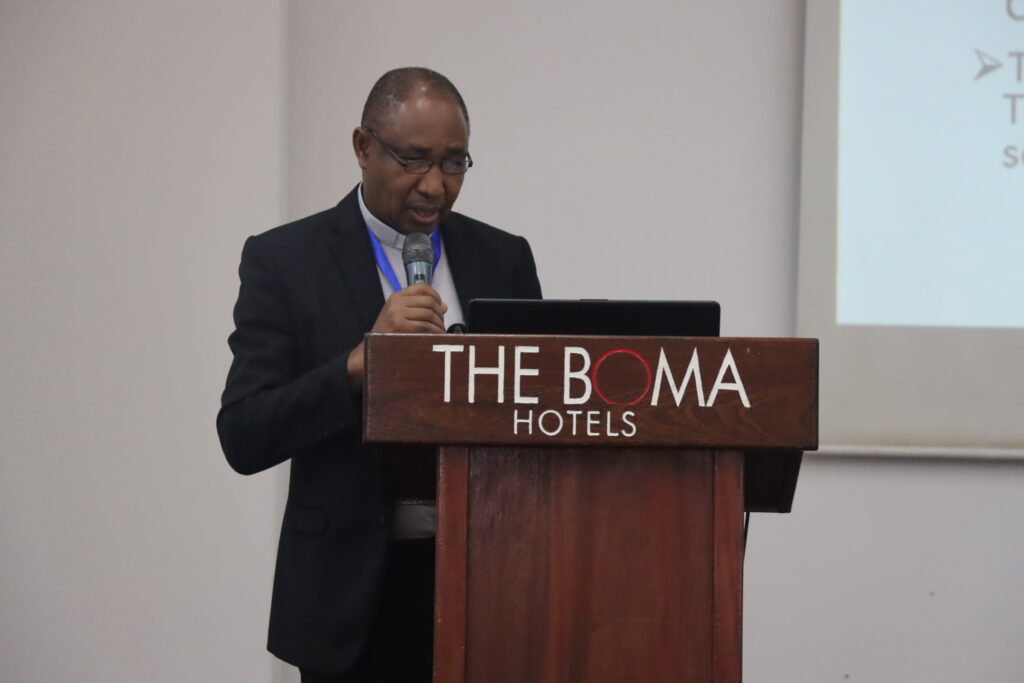AMECEA/CCC: It is Time for Collaborative Action, Says AMECEA Secretary General at CCC Convening

Fr. Anthony Makunde
Sr. Jecinter Antoinette Okoth, FSSA
At the ongoing convening discussing about Catholic Care for Children (CCC), the Secretary General for the Association of Member Episcopal Conferences in Eastern Africa (AMECEA) has emphasised the need to make a move as a team and implement the Catholic social teachings on better ways of caring for children.
Addressing participants on Wednesday, May 17, Very Rev. Fr. Anthony Makunde noted that even though Religious women are known to be concerned about caring for the needy and vulnerable children, the mission is meant to be for everybody in the Church and the time is now.
Since the mission of the Church is to evangelize, the cleric told participants drawn from various continents, sectors and nationalities, “the mandate on care for children has its foundation in the teaching of the Church.”
He identified four key Church documents which explains on the same teaching of evangelization as the essential mission of the church but with particular emphasis.
Talking about Ad gentes (To the Nations) which is the Second Vatican Council’s decree on missionary activity of the Church, “The document establishes evangelization as one of the fundamental missions of the Catholic Church and reaffirms the tie between evangelization and charity for the poor.”
According to Fr. Makunde, “The mission of the Church is modeled on the divine mission of our Trinitarian God: the mission of the Father, the mission of the Son, the mission of the Holy Spirit and it comes from the heart of God the fountain of love.”
He emphasizes that the mission is shared by all the baptized whether clergy, religious, and laity, each “according to their own state, and this is what we are called to do collaboratively in caring for children.”
Expounding on another Apostolic Exhortation issued by Pope Paul VI Evangelii Nuntiandi, Fr. Makunde shaded light on the aspect of evangelization as a means of “bringing the Good news into all the strata of humanity.”
“The Church is an evangelizer, but she begins by being evangelized herself. She is the community of believers, the community of hope lived and communicated, the community of brotherly love, and she needs to listen unceasingly to what she must believe, to her reasons for hoping, to the new commandment of love,” reads part of the Apostolic Exhortation elaborating on the mission of the Church.
 The other document issued by Pope John Paul II (St.) Redemptoris missio, teaches the Church on the permanent validity of her missionary mandate.
The other document issued by Pope John Paul II (St.) Redemptoris missio, teaches the Church on the permanent validity of her missionary mandate.
The Pope’s document is a “call to all church sectors to renewal of their enthusiasm and commitment to evangelize the world,” the AMECEA Secretary General narrated pointing out that in this document, all are invited to participate; “peoples everywhere to open the doors to Christ.”
Thus, he said “The Christian family is a key and irreplaceable force in evangelization where Christians are invited to “Carry out sincere review of their lives regarding the solidarity with the poor.”
Sharing the relationship between the Church’s mission and another document by Pope Francis Evangelii Gaudium (The joy of the gospel) on the proclamation of the gospel in today’s world, the Church official said, “We need an evangelizing Church that comes out of herself, not a Church that is self-referential and lives within herself, of herself, for herself.”
In this case Fr. Makunde highlighted to participants during his Wednesday presentation that all Christians are missionaries through baptism, and that “All Christians are ‘agents of evangelization” which calls for personal involvement of every baptized person.
“The mission to Care for Children can be guided by Jesus’s teaching when he said, I was hungry, thirsty, naked, a stranger… and you were there for me,” he said encouraging participants attending the ongoing convening on Catholic Care for Children that their ministry is rooted in the Church’s mission.
The cleric called all participants to “Capitalize and make use of good African values in child upbringing,” as he questioned What went wrong that Africans lost their essential values.


